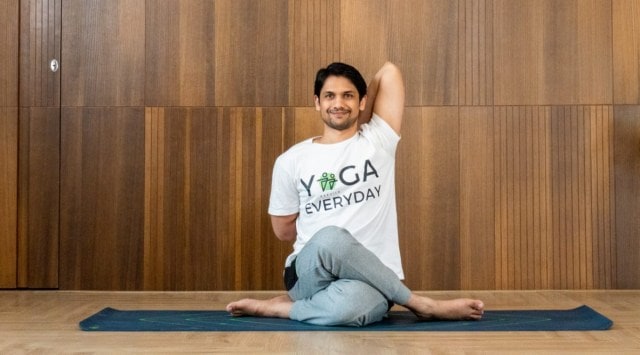An accidental startup that now teaches yoga to thousands across the globe
One of India’s fastest-growing wellness platforms, Habuild has one goal: Make people commit to some form of exercise.
 In the picture, Saurabh Bothra, engineer from IIT-BHU. (Express photo)
In the picture, Saurabh Bothra, engineer from IIT-BHU. (Express photo) On March 22, 2020, when a Janata Curfew was announced in India, a group of yoga practitioners decided to offer lessons over Zoom and YouTube because it was the best that they could do for a country under lockdown.
Every morning for 45 minutes, Saurabh Bothra, an engineer from IIT-BHU, and Pramod Yadav, a fitness buff from Nagpur, took viewers through simple breathing exercises, surya namaskar, and asanas for the upper body, lower body, core, and flexibility. They did not think that their journey would end in a startup and held the sessions for free.
By late May, there were 1,500 clients. Four months later, when the instructors started charging a fee because they wanted people to show up regularly, the numbers grew and kept growing even after the pandemic ended and yoga and fitness centres opened. Today, the initiative has turned into one of the country’s fastest-growing wellness platforms, called Habuild, which has trained more than 10 lakh people across the world and has 42,000 active members at present. Its total earnings are around $2 million.
Habuild stands for ‘habit building’. The company was founded by Bothra, Sheetal Pungliya, Trishala Bothra and Anshul Agarwal and is operated out of Pune and Nagpur. Trishala’s background is IIT-Bombay and London Business School while Agarwal is from IIT-BHU and IIM Calcutta. “What we talk about and promote is that people should commit to some form of exercise, even if it is as simple as walking for 10 minutes on a mat. Movement not only has benefits at the physical level but also the emotional and interpersonal levels,” says Pungliya, a Pune-based techie. “Once people have made a habit of moving, they are ready for breathing, meditation, and a gradual progress to other exercises,” she adds.
India’s wellness industry is buzzing with products and services. According to the Federation of Indian Chambers of Commerce and Industry (FICCI), the sector was worth Rs 1,10,000 crore in 2017, with a pre-covid estimated growth rate of 13 per cent to 15 per cent. More recently, the International Market Analysis Research and Consulting Group has calculated that India’s health and wellness market is likely to grow at 5.55 per cent during 2023-2028.
Research had shown the Habuild team that the majority of people were health conscious but only a minority had the discipline to go to a gym or for sports regularly. Using Artificial Intelligence — the company is increasing expenditure on technology—the company created a system that makes it easy for people to cut laziness and inculcate the habit of exercising every day. What came as a surprise to everybody was that women signed up in large numbers and form the company’s main client base even now. Habuild sessions are also held at specific timings and no recordings are given out, a rule that, despite being inconvenient, has shown positive results.
Habuild’s business model is a market disruptor. The company is not open to funding. “The primary reason for this is that, when you bring an investor, they would want returns and that is not the primary goal of what we are trying to do. What we want to do is to reach more people. We are community-driven and everything we do is about people,” says Bothra.
Habuild is also majorly reliant on referrals, which is a traditional way to generate clients and revenue, but slow and uncertain. “In the long run, referrals are the best way to build a brand. Our target audience doesn’t even go on a website to look for us. They find us on YouTube, Instagram or WhatsApp. These are the primary mediums of communication for us,” says Bothra.
The company’s strengths are its community-building initiatives. Apart from yoga sessions every day, they have events on journaling, face yoga and fasting. Bothra, who is the face of the company, leads from the front by exercising every day and following a yoga lifestyle, which includes eating before sunset and observing maun or silence on certain days.
On June 21, International Yoga Day, Habuild will attempt a world record with World Records Union for maximum concurrent viewership in live yoga sessions by launching a 21-day free online yoga challenge. The accidental startup is also looking at a “practical target” of reaching 1 lakh members by January 2024.

































